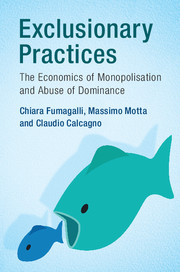3 - Exclusive Dealing
Published online by Cambridge University Press: 05 January 2018
Summary
Introduction
This chapter deals with exclusive dealing, that is, contracts between a seller and a buyer whereby the buyer commits not to make any purchase from a competing seller. We therefore distinguish exclusive dealing from exclusivity rebates (that is, market-share discounts conditional on the buyer purchasing all or most of its requirement from a given supplier) because the latter do not include a commitment on the side of the buyer, but just an offer from the seller to award a certain discount if a certain condition has been fulfilled (such discounts are discussed in Chapter 2).
As we shall see in this chapter, there exists a large body of economic literature which shows the possible anti-competitive effects of exclusive dealing, so it would be hard nowadays to deny the potentially exclusionary role of this practice. However, we find it instructive to adopt a historical approach, and start our analysis from the Chicago School arguments, according to which exclusive dealing cannot have an anti-competitive nature, to then explain why such arguments are not robust.
Until the early 1960s, US courts expressed hostility towards exclusive dealing. (We present a historical overview of the landmark cases of exclusive dealing in both the US and the EU in Section 3.6.) The basic underlying argument seemed straightforward and compelling. Suppose there is an incumbent producer, one buyer of that product, and a potential entrant which ismore efficient than the incumbent. If the incumbent and the buyer can sign an exclusive contract before entry takes place, efficient entry will be deterred. Since the contract commits the buyer to purchase exclusively from the incumbent, the entrant would not be able to sell if it entered the market. Therefore, the entrant would be better off staying out of the market (thus saving entry costs); and this generates an adverse effect on consumer welfare.
This attractively simple view was later criticised by Chicago School scholars. Posner (1976) and Bork (1978), for instance, argued that using exclusive dealing to deter efficient entry would require the payment of too high a compensation to the buyer, and would therefore not be a profitable strategy for a seller.
- Type
- Chapter
- Information
- Exclusionary PracticesThe Economics of Monopolisation and Abuse of Dominance, pp. 239 - 349Publisher: Cambridge University PressPrint publication year: 2018



